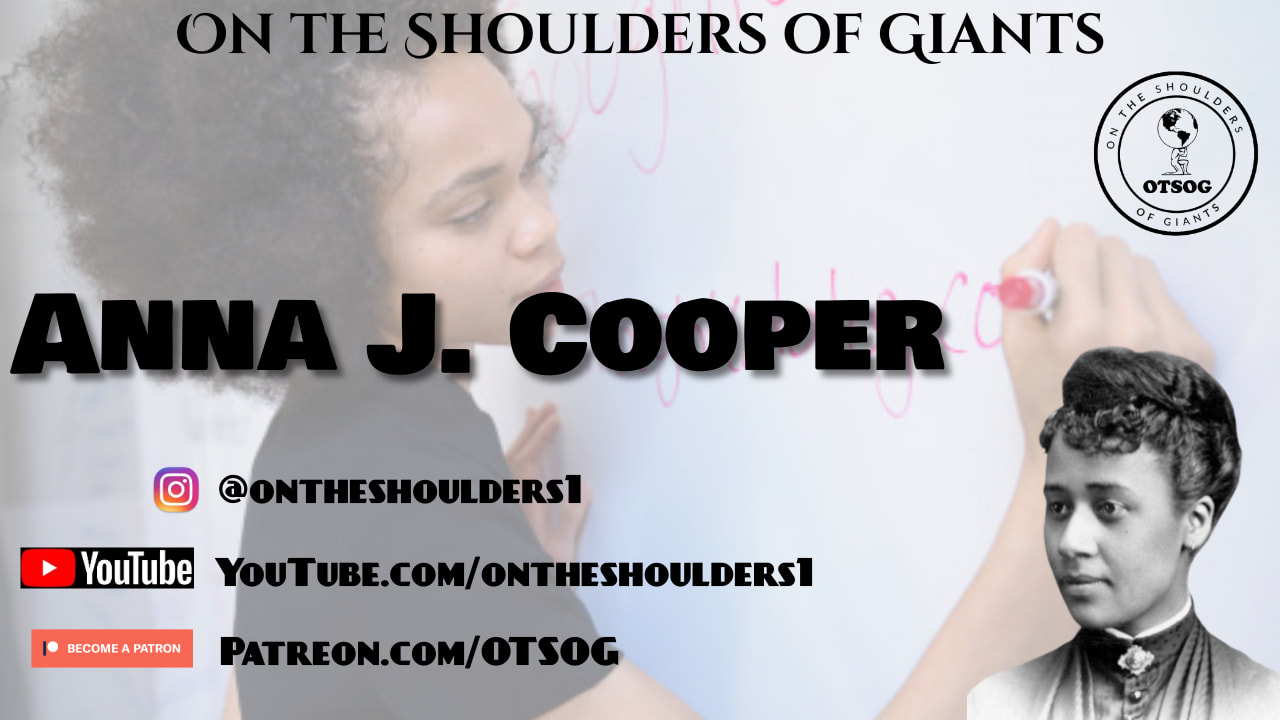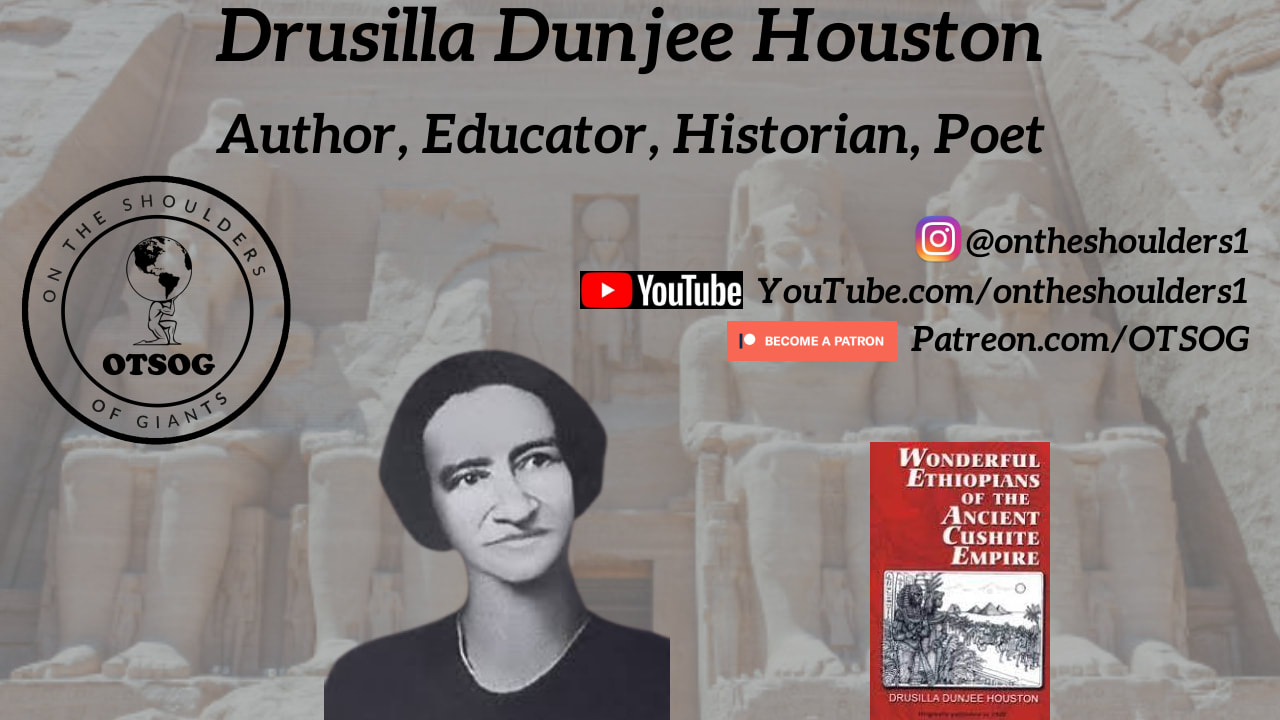|
On August 10, 1858, Anna Julia Haywood was born in Raleigh, North Carolina, to parents Hannah Stanley Haywood and George Washington Haywood. Hannah was an enslaved black woman and George was the man who enslaved her mother. George was the son of North Carolina’s longest-serving Treasurer and co-founder of the University of North Carolina, John Haywood. Like most black women of the times, Anna worked for the Haywood's as a servant until the age of nine when she received a scholarship to attend Raleigh’s Saint Augustine's Normal School and Collegiate Institute. The Episcopal Diocese of Raleigh founded the institute to train teachers to educate formerly enslaved black people. Anna spent fourteen years at the institute and distinguished herself as a premier student in the subjects of liberal arts, mathematics, science, English literature, and she even mastered Latin, Greek, and French languages. Though the institute was designed to educate formerly enslaved people, it reserved its upper-level classes for men, until Anna challenged the institute by proving her intellectual prowess and succeeding in being admitted into the class. One of the young men in the class was George A.C. Cooper, the two would marry but George died two years into the marriage. While completing her education at St. Augustine, Anna became a tutor for her fellow classmates. The money she earned from tutoring was used to pay for any expenses not covered by her scholarship. After graduating from St. Augustine, Anna became an instructor for the 1883 school year but taught through the 1886 school year, teaching subjects such as classics, English, vocal and instrumental music, and history. The academic route Anna was following was designed for male students, but she was determined to receive the best education available. Her next step in her academic journey was moving to Ohio to attend Oberlin College and was admitted as a sophomore because of how excellent her academic record was. She was well-rounded in her academic studies but studying music was one of the reasons she chose to attend Oberlin. She had a reputation for taking as many courses as she could because she had a thirst for knowledge, but she did not have the time or capacity to take all the classes she wanted. Anna graduated from Oberlin in 1884 and was classmates with other notable black women such as Mary Church Terrell and Ida Gibbs. Anna was a member of a literary society “LLS” who hosted events featuring orchestras, singers, and well-known lecturers. Between 1884 and 1885 Anna taught at Wilberforce College, 1885 was the year she returned to St. Augustine to teach before deciding to return to Oberlin as a graduate student earning her master’s degree in mathematics. Anna and Mary Church Terrell were the first two black women to earn a masters’ degree in 1888. In the year 1900, she attended the First Pan-African Conference in London, England to contribute her ideas to the upliftment of African people around the world. During her time in Europe, she visited many cities and landmarks. Let’s go back a few years to the year 1892, the year Anna moved to Washington D.C. Anna, along with Helen Appo Cook, Ida B. Wells, Charlotte Forten Grimké, Mary Jane Peterson, Mary Church Terrell, and Evelyn Shaw came together to form the Colored Women’s League, an organization created to promote unity and interest in the black community. Anna took a teaching job at the M Street High School, in 1901, she was eventually named the principal of M Street High School. Her time as the principal of M Street High School was cut short because of a difference in teaching philosophy with the school's governing body. She believed in the philosophy of W.E.B. Dubois while the school was structured by the philosophy of Booker T. Washington. She would later return to the school but it was Anna once again taking a stand for what she believed could help her people. 1892 was the year Anna published her first book A Voice from the South: By a Black Woman of the South. The book was well received and also led her to have public speaking opportunities where she spoke up for the rights of black people and women. Anna was a dynamic woman, after some time speaking publicly she decided to let her pen do the talking for her. In 1883, Anna produced the classic paper "The Intellectual Progress of the Colored Women of the United States since the Emancipation Proclamation" while in Chicago, Illinois attending the World's Congress of Representative Women. As one of five black women invited to the event to speak, she surely left her mark on the hearts and minds of the audience. Anna produced another remarkable paper in 1900 titled “The Negro Problem in America.” September 5th, 1902, she set the hearts of her people on fire when she delivered her speech "The Ethics of the Negro Question." 1914 was the year that Anna began pursuing her Doctor of Philosophy degree at Columbia University but tragedy struck her family. Her brother’s wife died and she adopted their five children which caused her to stop pursuing her Ph.D. temporarily. She faced many obstacles over a ten-year period in an attempt to earn her Ph.D., she also spent that time studying and preparing her dissertation and in 1930 retiring as an educator from Washington Colored High School. Her retirement didn’t last long, soon she became the president of Frelinghuysen University in Washington D.C. She worked at the school for ten years and left the school at the age of ninety-five. Thirty years prior to leaving Frelinghuysen, at the age of sixty-five, she became the fourth black woman in American history to earn a Doctor of Philosophy Degree. Her journey that started ten years earlier finally came to an end despite all the obstacles she faced. In 1964, at the age of one-hundred-five, Anna Cooper died leaving a great legacy in academics, literature, public speaking, civil rights, and women’s rights. Several of her works were published such as A Voice From the South, Le Pèlerinage de Charlemagne, Slavery and the French revolutionists, L'attitude de la France à l'égard de l'esclavage pendant la révolution, and The Voice of Anna Julia Cooper: Including A Voice From the South and Other Important Essays, Papers, and Letters. Her writing "The Early Years in Washington: Reminiscences of Life with the Grimkés," was also published. She was born in slavery but died a free woman. Free to educate and elevate herself and as many people as she could. Miss. Anna J Haywood Cooper, we proudly stand on your shoulders. J. A. Ward Click here to purchase the On the Shoulders of Giants book series. References: https://en.wikipedia.org/wiki/Anna_J._Cooper https://blackhistory.news.columbia.edu/people/anna-julia-cooper https://douglassday.org/cooper/ https://www.feministsforlife.org/anna-julia-cooper/
0 Comments
On January 20, 1876, Drusilla Dunjee was born in Harpers Ferry, West Virginia, to parents Rev. John William Dunjee and Lydia Ann Taylor Dunjee. Rev. Dunjee worked as a teacher and a preacher who was employed with a Normal School associated with the Baptist Missionary Association. He received a college education at Storer College in West Virginia. Drusilla was one of nine children her parents produced, and one of three who survived to grow into adults. As a young woman, Drusilla attended a preparatory school where she developed the skill of playing the classical piano and actually studied at the Northwestern Conservatory of Music in the state of Minnesota. Rev. John and Lydia Dunjee moved their family to Oklahoma City, Oklahoma in 1892, Rev. John was given a new position in Oklahoma by the Baptist Governing Board. 1892, is also the year Drusilla began teaching kindergarten until the year 1899, during this time, she was one of the first kindergarten teachers within her Oklahoma school district. Drusilla decided to pursue teaching as a career rather than the career of a musician. In 1898, she met and eloped with a man named Price Houston, the couple moved to McAlester, Oklahoma to start their life together. As a teacher in Oklahoma, Drusilla became dissatisfied with the quality of education young black boys, girls, and woman were receiving, so she opened the McAlester Seminary for Girls, a school she operated for twelve years before becoming the principal of the Oklahoma Baptist College for Girls in Sapulpa, Oklahoma, a position she held for six years. After serving as principal of the Oklahoma Baptist College for Girls, Drusilla and her family moved back to Oklahoma City where she founded her second educational institution, the Oklahoma Vocational Institute of Fine Arts and Crafts. 1934, was the year she began working for the Oklahoma Home for Delinquent Boys as their religious director before she would begin making significant contributions to American literature and African history. In 1926, Drusilla published her groundbreaking book Wonderful Ethiopians of the Ancient Cushite Empire, a book that is considered a classic and made her the first black woman to write a comprehensive multi-volume book covering the history of ancient Africa. The book was written over a twenty-five-year period as Drusilla conducted and compiled her research. During that time, she also contributed to her brother Roscoe’s newspaper the Black Dispatch, which was an important newspaper for black people. After publishing her book, Drusilla faced backlash from prominent black historians and public figures, but over time her works were confirmed to be accurate and pioneering work in revealing ancient African history, decades before a number of our well-known and beloved African scholars. As a journalist, she began her career in 1917 writing for her brother Roscoe’s then newspaper the Bookertee Searchlight before she wrote for his Black Dispatch newspaper. She also wrote for the Arizona Journal and Guide after moving to Arizona in 1935, where she continued to use her words to fight for the rights of her people as well as educate her people about their wonderful past. Because of health reasons, Drusilla moved to Arizona but she also began to receive praise for her groundbreaking work as a historian of African history, she also became a writer whose works were being syndicated through the Associated Negro Press, an organization she would become the director of for four years. Drusilla was both an advocate and activist for her people, she used her words to educate, motivate and empower, but she actively went into her communities to help found organizations like the Oklahoma YMCA, the Red Cross, the NAACP, and the Dogan Reading Room of Oklahoma. She was honored by the Association of Black Women Historians and Black Classic Press for her work as a historian and journalist. Historians account that she wrote six total volumes of Wonderful Ethiopians of the Ancient Cushite Empire but only volume two survived the years. She was also a poet and an important figure in the history of black people in America, because of her pioneering work to chronicle the history of Ancient Africa. She was the first black woman to write about the history of African people, and one of the first black people period to write about African history. She was fearless, driven, and loved her people so much she dedicated her life to educating her people, serving her people, and empowering them people through her gift of words. To Drusilla Dunjee Huston, we proudly stand on your shoulders. J.A. Ward Click here to support the On the Shoulders of Giants book series. References: https://www.uncrownedcommunitybuilders.com/person/drusilla-dunjee-houston-1 https://www.okhistory.org/publications/enc/entry.php?entry=HO038 https://en.wikipedia.org/wiki/Drusilla_Dunjee_Houston |
Details
Categories
All
Click Here to join our mailing list
|
Contact Us: |
Connect With Us |
Site powered by PIT Web Design



 RSS Feed
RSS Feed



